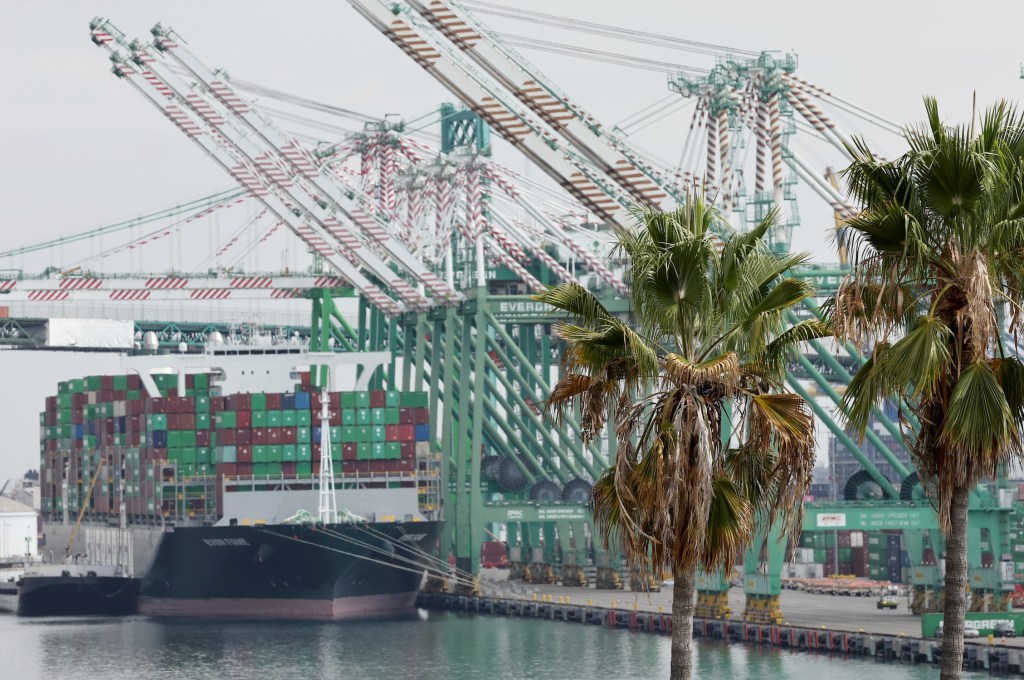Physical Address
304 North Cardinal St.
Dorchester Center, MA 02124
Physical Address
304 North Cardinal St.
Dorchester Center, MA 02124

Tariffs levied by the Trump administration are inevitably set to negatively impact consumers and small businesses alike, according to the head of California’s top retail lobbyist.
“I think consumers are really going to get sticker shock in the next few months—if these tariffs really become a reality, coupled with the insurance crisis in California, gas prices…and some of the rising costs on the consumer index,” said Rachel Michelin, president and CEO of the California Retailers Association during a briefing with the Port of Los Angeles on Wednesday. “We’re hitting a tipping point and consumers can only take so much.”
Michelin said that the larger national brands within the association can pivot by importing goods earlier and can absorb some of those costs for a longer period. But smaller businesses don’t have that luxury.
“I worry about my smaller retailers. I know we all want to put Covid in the rear-view mirror, but some of those smaller retailers are still catching up from it,” Michelin said. “They’re finally getting…back to normal and now we’re hit with this.”
According to Michelin, the Department of Commerce has thus far given no guidance on how long it will take to have systems in place that will collect duties on small, low-value packages that used to enter the U.S. via the de minimis trade exemption.
The future of that trade exemption is still up in the air, with the Trump administration suspending it as part of its executive order against China. The administration reversed the suspension just days later, but businesses now are tasked with preparing for more uncertain scenarios.
Tying in with the concerns about both the China tariffs and the uncertain future of de minimis, Michelin also said that more retailers in the 400,000-member association are shifting production out of China.
While China once comprised 57 percent of the port’s throughput, that number is now 45 percent, and likely will continue to shift downward, according to Gene Seroka, the executive director of the Port of Los Angeles.
“For every retailer that is moving out of China to look for sourcing in other locations, the first conversation begins with the China cost plus the new tariff—that’s the cost out of ‘new country A,’” said Seroka. “It’s not so much finding and chasing that cheaper price, it’s trying to stay fluid with cargo that gets to the American consumer. All of this yields higher prices.”
Seroka said the current state of cargo flow into the California hubs has thus far mirrored the run-up in cargo after the implementation of tariffs by the first Trump administration in 2018. That concluded with “pretty big drop-offs” as the tariffs fully kicked into effect.
“It’s no different now. We’ve had seven consecutive peak season type months all in preparation for possible tariffs that were talked about on the campaign trail last summer,” Seroka said. “No backups, no bottlenecks.”
When asked whether he expects Southern California ports this year to retain some of that discretionary cargo that was captured from the East and Gulf Coast port labor negotiations, Seroka didn’t directly answer the question. But he said “we’ve underperformed,” when it comes to containers entering the U.S.
The briefing came after the Port of Los Angeles revealed it had its busiest January ever in anticipation of the tariffs, seeing total containers processed jump 8 percent to 924,245 20-foot equivalent units (TEUs).
The Port of Long Beach also had the hottest start to a year yet, with a monumental 41.4 percent increase in containers moved to 952,733 TEUs.
Both ports were catapulted by a heavy acceleration in imports, with the L.A. port reeling in 483,831 TEUs, a 9.5 percent increase compared to the previous year. Imports soared 45 percent to 471,649 TEUs, according to the L.B. port.
As the San Pedro Bay ports continue to be flooded with record cargo, one handful of truckers serving the L.A. port is taking work action.
More than 70 truck drivers working for Southern Counties Express, a division of truckload company Universal Logistics Holdings, went on strike Thursday morning over pay changes and increasing healthcare costs. The drivers represented the local Teamsters 848 branch.
“Southern Counties Express is disappointed in the union’s decision to strike. The company has explained its financial hardships to the union and the union ignored our pleas for help. The company has enacted its best offer, which included several items requested from the union,” the company said in a statement. “Under the company’s offer, many drivers are receiving higher pay. And those who do not like the offer have the option to take a voluntary buyout.”